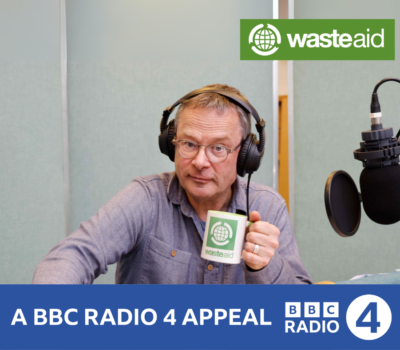
News, Thought Pieces,
WasteAid Teams Up With BBC Radio 4 and Hugh Fearnley-Whittingstall For Fundraising Appeal.
Our BBC Radio 4 Appeal is now live! We’re thrilled to feature on BBC Radio 4 this week where our fundraising appeal is being...
One of the first people to take part in WasteAid’s initiative in Cameroon was Djoukou Tapang Julienne who’s known to most as Mama Pasto. Her story truly shows how lives can be transformed when people have access to the right opportunity, support and tools.
When WasteAid first met the 49-year-old mother of five she was working as a “Buy and Sellam” selling bread loaded with boiled and seasoned beans, after losing her job as fund collector at a savings and credit union following an accident.
As age began to catch up with her, Mama Pasto decided that she needed another way to support her family. Now, after receiving support from WasteAid, she runs her own informal cooperative of pickers, and provides training to others in the community to ensure she leaves a lasting legacy.
Mama Pasto initially took part in a training course delivered by WasteAid, to learn how to manufacture paving tiles but after realising that she didn’t have the space or time to make the tiles she joined the charity’s programme to become a waste collector.

“Thanks to the training I received, this is the first year that none of my children have had to be taken out of school – I’ve been able to pay all the school fees for the whole year,” she said.
Collaboration and empowering communities are at the heart of WasteAid’s ethos and is a commitment that Mama Pasto is passionate about.
“Now, I’m also training others as we need to involve our peers so that the work can continue what has been started. Even if I am no longer here (I’m getting old at 49 you know!) I can say that I left a legacy and young people are working because of me.”
Her commitment to sharing the benefits of WasteAid’s programme has seen her launch her own paid summer internship for young people to help them earn money for notebooks. She is also committed to training members of her community.

“I paid them around £91 per month and my concern was just to make sure that we were all making money together. More than 23 tonnes of plastic waste have been collected and sold this year through my endeavours and my wonderful team. While we have some work to do to improve the quality of plastic being collected, it’s a good start to see people recognising the work I am doing and getting involved.”
Not only has the support Mama Pasto received allowed her to support her children’s education and others in the community but it has also given her the opportunity to earn an income that has seen her buy land and gain an additional rental income.
“I was so happy to be part of this training programme and what I’m doing now is possible because of that training. I would like to thank WasteAid for the knowledge I gained as it’s unusual to receive such training for free.” she added.
Mama Pasto’s story is inspiring people throughout her community and beyond.
As WasteAid prepares to open the waste collection and sorting facility in Bilongué 2, Mama Pasto’s story shows just what is possible.
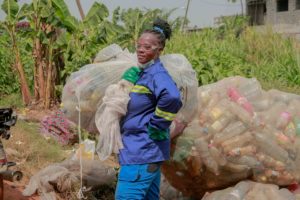
Please help us to support more people like Mama Pasto to create change by donating to WasteAid today.
This thought piece is written by WasteAid’s Circular Economy and Waste Management Lead, Rebecca Colley-Jones, following a recent visit to one of WasteAid’s project locations in Douala, Cameroon.
Having joined WasteAid at the beginning of November 2022, I had the privilege of embarking on my first field visit to Douala, Cameroon two weeks later with our CEO Ceris Turner-Bailes. WasteAid has had links to Cameroon for a number of years and started formally delivering programmes in January 2020, funded initially through the UK AID Match programme.
The main focus of my visit, aside from familiarising myself with WasteAid’s work in Douala, was to follow up on our initiative to build and support a Plastics Recovery Facility (PRF) in Douala 3. Land for the PRF had been allocated by the municipality to build the facility, as the Mayor and his team were keen to see such a facility located within their district, and were excited by the potential of the PRF to assist in providing a solution to the area’s plastics pollution challenge. The aim of the PRF is to adopt a circular economy approach recapturing plastic materials, adding value to them and ultimately closing the loop on plastics.
WasteAid’s partnership with leading global private markets firm, Partners Group, began at an integral time for this programme. Funding from the Partners Group employee foundation, PG Impact, meant that we could scale the impact and increase livelihood opportunities for more young people, with positive outcomes for the wider community and environment. Cameroon has a population of 27 million with over 55% living in poverty[1], so it was significant that we are able to reach more people through this partnership.
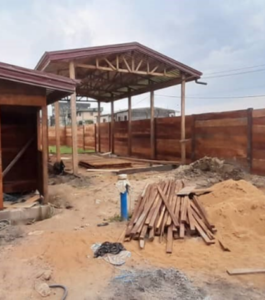
In order to ensure that the infrastructure we provide is right and to make the site as self-contained as possible, we decided to look at the possibilities for rainwater harvesting to maximise water use and efficiency. Electricity can be sporadic so to tackle this challenge we decided to look at the possibility of installing solar panels, and also look at two types of bailers to be manufactured locally – one electric and one manual – and I am working with our Cameroon project team to source the right equipment.
In terms of activities on the site, we went out to interview potential users to see what they would need in order to add value. We will be catching up with some of these people and sharing their stories in the coming weeks, currently most collectors are working either out of their homes or at the side of the street. The PRF will enable collectors to increase efficiency and add value to the collected plastics. With more collectors on board thanks to Partners Group, we will be seeing a higher volume of plastic collected and diverted from drains, rivers and the ocean.
To ensure sustainability, WasteAid works within the existing value chain, finding ways of further supporting those working within it. To understand how best the PRF could integrate into the current local value chain, it was decided to assess the market. Visits were made to a number of off takers of plastics, NAME, SC2R and RedPlast. Following our visits, it was concluded that the best use of the site was for it to operate as a bulking and cleaning facility, users will be able to sort, clean and store quality plastic. By washing and baling plastic bottles, the collectors can access better markets, obtain a better price (almost double) when selling to off takers. This has the potential to make a huge difference to their livelihoods, improve the quality of the collected materials and prevent pollution by closing the loop on plastics. The PRF will support a further 45 people in the community of Bilongué 2 in Douala.
We have now appointed a PRF supervisor, and are sourcing the various pieces of equipment needed to complete the infrastructure at the facility. Recruiting of the collectors who will use this facility is currently underway. Many of the potential users of the PRF are actually graduates of WasteAid’s UK AID Match programme who now have small waste collection businesses and networks of collectors.
It was fantastic to see the enthusiasm for WasteAid’s activities in Cameroon, and get feedback on how WasteAid’s initiatives are making a real difference to waste collectors’ lives and helping build a circular solution for Doula’s plastics.
[1] https://www.wfp.org/countries/cameroon
Written by Ceris Turner-Bailes, Chief Executive WasteAid.
In November, I had the privilege of travelling to Douala, Cameroon to follow up on WasteAid’s projects there. I was delighted to travel with our new Circular Economy and Waste Management Lead, Rebecca Colley Jones – this was Rebecca’s first visit in support of our projects. As many will know, WasteAid has had links to Cameroon for a number of years and started formally delivering programmes in January 2020 funded initially through the UKAID Match programme. Biffa staff were instrumental in WasteAid achieving the level of funding required so that this amount could be ‘matched’ by the UK government. They contributed a total of £36,000. This was a fantastic effort and Biffa’s fundraising skills resulted in a huge step forward for community collection and recycling activities in Douala. Despite the pandemic resulting in this project being suspended for almost a year, the initiative was finalised in August 2022 with some fabulous results. Over the almost 24 months of active programming, 47.8 metric tonnes of mixed plastics were collected for recycling and transformed into 2537 square metres of paving tiles. At the same time 165 programme participants were trained on life skills and recycling techniques, with over half of those now in employment. This is something of which all of us at WasteAid and Biffa can be proud.
The city of Douala still faces significant challenges in managing its waste, with plastics and organics waste streams dominating. The situation depicted in images of drains and rivers filled with plastic that many of you know well has not entirely changed and the waters of the Douala Estuary still remain highly polluted. However, it was heartening to meet with many of the stakeholders within Douala’s circular economy and to understand that real efforts are being made there to tackle the waste problem. WasteAid’s presence in Cameroon and its initiatives have been welcomed. To ensure sustainability, we want to work within the existing value chain, finding ways of further supporting those working within it. To that end part of the visit was also to follow up on our initiative to build and support a Plastics Recovery Facility (PRF) in Douala III. Crucially, we have been allocated land by the local authority on which to build and both the Mayor and his staff have been extremely keen to support our work.
Following the hugely successful gala event held by Biffa in May 2022, a proportion of the funds raised went towards supporting this PRF project, particularly contributing £15,000 to the construction of the centre itself. I was delighted to be able see great progress during my visit. The centre is now about 70% completed with walls and a roof and our focus is now the purchase of equipment and recruiting the collectors who will use this facility. We need to ensure that both the infrastructure and the system we use are fit for purpose. I am delighted that some of those likely to work in the PRF are actually graduates of WasteAid’s UKAID Match programme who now have small waste collection businesses and networks of collectors. We will be catching up with some of these people and sharing their stories in the coming weeks.
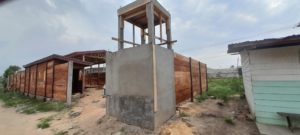
There is still a lot of work to do to ensure that the infrastructure we provide is right and Rebecca is now working with our Cameroon project team to source the right equipment. By washing and baling plastic bottles, the collectors can almost double the price when selling to off takers and this has the potential to make a huge difference to their livelihoods. The PRF will also allow the collectors to process more plastic, at the moment most collectors are simply working by hand at the side of the street. WasteAid will support the Douala plastics value chain and 45 collectors through this sustainable PRF that has simple washing and baling facilities. Whilst this may seem very simple, the increase in income will help the waste collectors significantly improve their livelihoods and will further prevent plastic pollution in the communities of Douala.
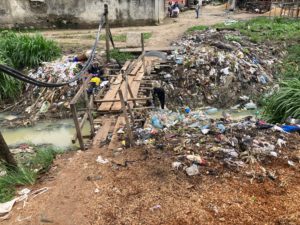
In June 2020, WasteAid embarked upon an innovative and expansive programme to support circular economy solutions to the waste crisis in three locations; Ho Chi Minh in Vietnam, Guwahati in India and Johannesburg, South Africa. Supported by Huhtamaki, this programme finally drew to a close in autumn 2022.
In just over 2 years there were some fantastic results achieved – WasteAid’s Circular Economy Networks had been developed in 3 locations. The networks attracted over 1,000 members with more than that number attending the online webinars and trainings that were developed (even the pandemic didn’t stop the progress). The partnership supported 36 entrepreneurs through tailored business training and mentoring and 6 entrepreneurs were awarded with 10,000 Euros each of seed funding. Those supported included a plastics recycling enterprise in India, an organics and composting enterprise in South Africa and an app developer in Vietnam aiming to make waste collection more accessible and efficient.
The partnership between Huhtamaki and WasteAid has clearly moved the needle in terms of both local perceptions of waste and direct action to reduce waste pollution. By orienting the programme towards supporting and strengthening existing systems and local innovators, the partnership has ensured a sustainable legacy. A relatively young international non-profit focused on tackling the global waste crisis through support to and promotion of solid waste management systems and circular economy innovations, the financial investment from Huhtamaki was a game changer for WasteAid. The organisation cut its teeth delivering community-based interventions in Sub Saharan Africa rooted in the premise that livelihoods and environments can be improved through training and skills in waste related activities. However, with Huhtamaki’s ambition and vision for the partnership, WasteAid was able to expand its horizons in terms of scale and depth of intervention.
Image: BoombaDotMobi – A winner of the Zero Cities Waste Challenge in South Africa.
The purpose of the partnership was to bring together diverse stakeholders in 3 localities to build and share knowledge in waste and recycling activities, to facilitate discussions and collaboration between those at different points in the waste value chain and to practically support and finance local entrepreneurs and innovators, ‘wastepreneurs’. The partnership recognized that where there is a lack of municipal waste systems, the private sector and even more the informal sector fill that gap. The networks were rooted in community responses. The innovators and entrepreneurs that were supported also had a social value element, for example offering employment potential to those in a lower socio-economic bracket or providing finance to young innovators from deprived areas who would not be able to access traditional finance.
Above all the networks attracted significant diversity, of course there were those directly linked to the waste value chain in some way from local government, enterprise or trade organisations, but equally there were leading academics, multinational corporations, local businesses, Chambers of Commerce and international governments who became stakeholders in the networks, not to mention nearly 200 Huhtamaki employees who engaged in activities to support the partnership in the different locations.
A key element to the programme was flexibility, ideas conceived in London or Helsinki had the space to be tried locally to ensure they were relevant, needed and impactful. Some elements of the programme plan were deliberately light on detail at the outset to ensure that the local membership could themselves identify their greatest needs and the network could grow organically. This meant that the partnership could focus on tackling important local issues identified by those closest to them, for example how to maximise benefit from End Producer Responsibility legislation in South Africa or strategies to grow domestic recyclables in Vietnam given the high quantity that are imported.
And yet perhaps the biggest impact of all has been what has happened outside of the confines of that initial programme. The approach taken by Huhtamaki and WasteAid has captured the imagination of other funders keen to implement a meaningful sustainability strategy and the initial circular economy network model has been adapted and exported by WasteAid to two further countries, Gambia and Egypt and extended further in South Africa. The success of this approach and the common thread running through these networks is that they are rooted in the local context, that whilst funded by Huhtamaki and facilitated by WasteAid, they are owned by their members. The second critical element is that there are seriously bright ideas borne out of local challenges and that home grown solutions to the waste crisis are often the most sustainable and should be supported. As access to finance remains a significant challenge to many working with waste in lower and middle income countries, the approach developed by the partnership fills a critical role in supporting youth entrepreneurship, skills and training.
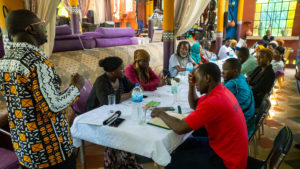
The original programme focused very much on the community level and how the grassroots could drive the circular economy, but this is not entirely the case in all countries. In Gambia, for example, it was recognized that it was at local authority, government agency and Ministerial level where the most traction would be had and so the approach to networking was adapted. Additionally, with other funders signing up to this approach, WasteAid has added a further mentoring element to the programme joining experts from a chartered institution in the UK to work with Gambian counterparts to find solutions to waste related issues.
Although the initial partnership funded some tremendously exciting initiatives, another question arose as to how those who were not yet at that relatively advanced level could be helped. The WasteAid team were keen to focus on the lower rungs of the waste value chain where holistic life skills training, business skills training and smaller injections of finance would have a massive impact. Huhtamaki has accompanied WasteAid on this journey and is now financing an entrepreneur’s fund focused on those on the first rung of the waste value chain. This approach is proving incredibly successful in Johannesburg. In Egypt a more geographically targeted approach was taken and the network was launched in Aswan, working again with local structures and the existing value chain. The Egyptian model mirrors the initial programme, however, has a focus on flexible plastics only as opposed to multiple waste streams.
Overall, the core elements of the Circular Economy Network approach have proven a particularly impactful mix and WasteAid continues to evolve its programme design as we learn more. However, the multiplier effect is clear to see, that initial ambitious vision developed by Huhtamaki and WasteAid continues to be developed and delivered throughout Africa, impacting thousands of individuals, hundreds of communities and dozens of circular economy enterprises.
Written by Ceris Turner-Bailes, CEO of WasteAid.
As we come to the end of COP27, this thought piece will examine how WasteAid’s work is helping to address the climate crisis through green entrepreneurship and reinventing waste solutions, two topics that are being covered on Solutions Day at COP27.
It is encouraging to see a focus on these topics at COP27. At WasteAid we believe that support to green entrepreneurship is critical when transitioning to a circular economy and helps to recapture valuable materials to use in new products providing environmental, economic and social benefits.

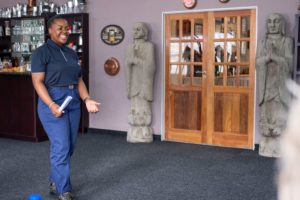
WasteAid believes that there are two key ways to support green entrepreneurs. Firstly, through tailored support to the entrepreneur. So many courses, curricula and business incubation approaches could be better tailored to the waste industry. Through funding from Bunzl PLC, we have been working in South Africa with the Wot-If? Trust to develop a bespoke course to ‘waste-preneurs’ who are working in townships in Johannesburg. These young women and men are individuals who are already working in the world of waste but living very much day to day. Through a holistic and practical curriculum delivered by trainers with lived experience of making a living out of waste, and culminating in a pitch to access funds for a business idea, we are giving these waste-preneurs an opportunity to grow their income earning potential. See a clip below of some of our waste-preneurs in action.
Similarly in The Gambia, WasteAid has a ‘challenge fund’ element to a project supported by the Chartered Institution of Wastes Management (CIWM). It is inspirational to see young entrepreneurs fired up about resource recovery and creating jobs at the same time. Currently three semi-finalists are going through a tailored business support programme and will compete in December for access to capex funding. African Swag is a female-led Gambian-based company making clothing out of bubble wrap, from aprons to shower caps. Green Youth Collective are a group of entrepreneurs making briquets from organic waste, and Plastics Recycling Gambia is led by a Gambian entrepreneur who is working to help set up the first network of aggregators and recyclers across The Gambia. Here the focus is helping those on the first rung of the ladder move up the value chain through tailored business support. See a link to our finalists below.
Finally, as well as bespoke training, access to capex and ongoing venture capital is key. Many green entrepreneurs have the solutions but given the low-risk appetite of investors it is difficult for them to go to scale. In Egypt, as part of Dow’s project REFLEX, WasteAid is working with Alfanar, an Egyptian-based company that specialises in venture philanthropy methodology, to design a challenge competition focused on green entrepreneurship. Three semi-finalists will access £10k of seed capital and business training with a final winner having access to long-term investment capital. The challenge is focused on social enterprises that have market-based solutions to the recovery and reuse of flexible plastics in Aswan and beyond. The challenge is still open for applications until 30th November 2022, to apply click here.
WasteAid believes that by fast-tracking local solutions to the circular economy we will get to net zero faster, but perhaps more importantly we will also ensure that the benefits of the circular economy are shared with the poorest communities we serve.
Written by Michelle Wilson and Rebecca Colley-Jones.
Yesterday’s themes at COP27 were Science and Youth and Future Generations. Two of the elements discussed during the day were around improving Africa’s resilience to climate change and the role of research, development and innovation in addressing climate change.
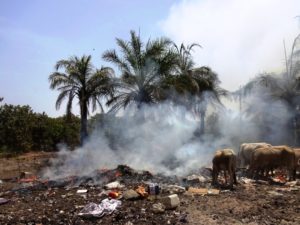
WasteAid agrees knowledge exchange is critical. One area we are experimenting with is bringing experts together from the global north and south to solve common waste issues. In The Gambia, WasteAid, funded by the Chartered Institutions of Wastes Management (CIWM), has set up The Circular Economy Network Project, known locally as ‘Dennakuwo’ to fast-track local solutions to the circular economy. A key part of this project is to bring together members of CIWM in the UK, many of whom come from municipal councils as well as the private sector with their counter parts in The Gambia. In November we held our first virtual engagement meeting bringing together the head of Kanifing Municipal Council and 15 members of CIWM on a virtual platform to exchange information and challenges around the implementation of anti-littering law. It is clear that the challenges faced in the UK are not that dissimilar to those faced in the The Gambia. Our hope is to see these fora to enable knowledge to be shared and innovative solutions to emerge.
Enabling knowledge exchange across the value chain is also critical. In Egypt WasteAid is working with Dow on its REFLEX project, to identify new and emerging ways of valorising flexible plastic. The aim is to support the development of the flexible plastics value chain in Aswan. In September we brought together representatives from the informal sector, the governate, environmental affairs, NGOs and producers in Aswan. The different groups were able to bring their knowledge on the challenges and opportunities on the PE value chain, each bringing a unique perspective. Through these interactions, connections have been formed and a more formal stakeholder group has emerged to help plan and move forward together to ensure increased recovery or secondary materials.
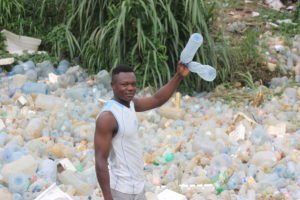
Circular economy provides great economic opportunities to preserve the value of materials and develop critical skills. The examples above demonstrate how we think knowledge exchange is central to solving issues caused by climate emissions that come from materials.
Written by Rebecca Colley-Jones and Michelle Wilson.